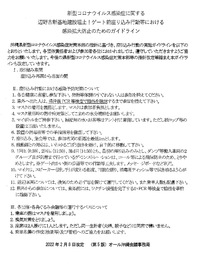2009年02月17日
Dear Madame Secretary 米国務長官へ
February 14, 2009
Dear Madame Secretary,
The people of Okinawa have never welcomed the continuous presence of United States military bases since the end of the Battle of Okinawa in 1945. We have been deprived of opportunities to express our own will regarding the bases. In his famous Fourteen Points speech, President Woodrow Wilson stated that “a free, open-minded, and absolutely impartial adjustment of all colonial claims, based upon a strict observance of the principle that in determining all such questions of sovereignty the interests of the populations concerned must have equal weight with the equitable claims of the government whose title is to be determined.” Yet even today the people of Okinawa do not fully own the right of self-determination which President Wilson saw as an essential condition for world peace. The very origins of the military base issue in Okinawa lie in the lack of this right of self-determination.
↓continue reading
Dear Madame Secretary,
The people of Okinawa have never welcomed the continuous presence of United States military bases since the end of the Battle of Okinawa in 1945. We have been deprived of opportunities to express our own will regarding the bases. In his famous Fourteen Points speech, President Woodrow Wilson stated that “a free, open-minded, and absolutely impartial adjustment of all colonial claims, based upon a strict observance of the principle that in determining all such questions of sovereignty the interests of the populations concerned must have equal weight with the equitable claims of the government whose title is to be determined.” Yet even today the people of Okinawa do not fully own the right of self-determination which President Wilson saw as an essential condition for world peace. The very origins of the military base issue in Okinawa lie in the lack of this right of self-determination.
↓continue reading
No matter how many times or how strongly the President and Congress would express their gratitude to Okinawa people for the hardships of letting US military bases operate in Okinawa, their words have never reached the Okinawa people’s hearts. Please imagine what we have experienced and try to understand why we would not accept your words of gratitude. For example, most of the US military bases were built on land that was forcefully taken away. SOFA is another cause of anger because SOFA severely limits Japanese judicial authority over crimes committed by US soldiers, even serious crimes like rape. And consider astonishingly beautiful coral reefs that would be destroyed to construct your new base in Henoko. The US government has refused to take any responsibility by claiming that the new base construction is solely under Japanese jurisdiction.
Another example: USMC Futenma does not meet the US operational safety standards for Navy and Marines airfield. Local residents are exposed to high risk flights and noise pollution, experiencing constant fear, while aircrafts fly over residential areas late at night and early in the morning. Okinawa, a small island, has lived under such great stress for over sixty years. The presence of US military bases has distorted not only the politics and economy of Okinawa, but also its society itself and people’s minds and pride. Do you think we would accept your gratitude in exchange for accepting these ongoing hardships?
We do not need to remind you that Okinawa is not your territory. Your fifty thousand military members act freely as if this is their land, but, of course, it is not. Please remember that we, the Okinawa people, own “the inherent dignity” and “the equal and inalienable rights of all the members of the human family,” which is stated in the Universal Declaration of Human Rights, just like your family and friends do.
These equal and inalienable rights are not respected in Okinawa. The governments of the United States and Japan legitimized the US military occupation of Okinawa with the San Francisco Treaty in 1952, and the reversion of administrative rights in 1972 created a structure of economic and financial dependency in exchange for the presence of US military bases on Okinawa. The governments have changed their strategy for maintaining the base presence from using force to using money.
This is a very cruel treatment. The people of Okinawa have increased dependency on such money. The money has created a system which has corrupted our minds. It has taken away alternatives. The acceptance of US bases is seen as the only way to live. Furthermore, US military bases in Japan are highly concentrated in Okinawa and this condition clearly shows discrimination. This is an absurd situation, isn’t it? It is as if the Japanese government has made Okinawa a drug addict and the US government takes full advantage of the addiction, in order to maintain its military presence. Violations of human rights and the destruction of coral reefs, a treasure of human kind, are taking place in Okinawa, despite the fact that it is a part of Japan which is a highly industrialized democracy.
“The world order” based on the American values and the “security of Japan” depend on the structure that deprives the Okinawa people of the “inherent dignity”. Those who are concerned with world peace should pay attention to this structure. Okinawa’s situation is one of the cracks of the world community that should be mended. Maybe Okinawa’s problems are small ones among the entire challenges that mankind is facing today. But it is a big issue for the people involved. When you have military bases on a foreign soil that does not accept and support them, you constantly need to be worried about the long term stability of the bases, and the potential crisis continues. This is a burden not only for Okinawa but for the US as well.
In 2005 and 2006, the governments of the United States and Japan reached agreements regarding the reorganization of US military bases in Japan. They agreed on the construction of new bases and it seems that they are trying to make the US military presence in Okinawa permanent. This plan would add a further burden on the people of Okinawa who have suffered long enough. In other words, something that other parts of Japan refused to accept would be dumped on Okinawa again. Most of us are opposed to the executive agreement that you would sign during your stay in Japan.
Here we state our tenets:
1. We demand that the governments of the United States and Japan cancel the construction of the new airfield in Nago City and helicopter landing pads in Higashi Village.
2. We demand that both governments materialize the immediate and unconditional return of USMC Futenma. We consider the “Package” policy that integrates Futenma’s return with the construction of new bases in Okinawa and Guam a mere cover for the forceful execution of their own will by stronger parties on Okinawa.
3. We demand that both governments further reduce US military bases on Okinawa, including the prompt return of bases south of USAF Kadena, whose return plan was already announced.
Please look into Okinawa’s situation from the standpoints of democracy, human rights, and environmental concerns during your visit to Japan. We hope that you will take new initiatives in U.S. policy toward Okinawa during the Obama administration.
President Obama states he would learn from Japan’s experience of “the lost decade of the 1990s” in his efforts to revive the US economy. The Okinawa people wish for you and President Obama to bring about the end of “the lost sixty-four years” forced on us by the US military bases.
Seigen Miyasato
Chairperson
Okinawa Foreign Policy Study Group
Another example: USMC Futenma does not meet the US operational safety standards for Navy and Marines airfield. Local residents are exposed to high risk flights and noise pollution, experiencing constant fear, while aircrafts fly over residential areas late at night and early in the morning. Okinawa, a small island, has lived under such great stress for over sixty years. The presence of US military bases has distorted not only the politics and economy of Okinawa, but also its society itself and people’s minds and pride. Do you think we would accept your gratitude in exchange for accepting these ongoing hardships?
We do not need to remind you that Okinawa is not your territory. Your fifty thousand military members act freely as if this is their land, but, of course, it is not. Please remember that we, the Okinawa people, own “the inherent dignity” and “the equal and inalienable rights of all the members of the human family,” which is stated in the Universal Declaration of Human Rights, just like your family and friends do.
These equal and inalienable rights are not respected in Okinawa. The governments of the United States and Japan legitimized the US military occupation of Okinawa with the San Francisco Treaty in 1952, and the reversion of administrative rights in 1972 created a structure of economic and financial dependency in exchange for the presence of US military bases on Okinawa. The governments have changed their strategy for maintaining the base presence from using force to using money.
This is a very cruel treatment. The people of Okinawa have increased dependency on such money. The money has created a system which has corrupted our minds. It has taken away alternatives. The acceptance of US bases is seen as the only way to live. Furthermore, US military bases in Japan are highly concentrated in Okinawa and this condition clearly shows discrimination. This is an absurd situation, isn’t it? It is as if the Japanese government has made Okinawa a drug addict and the US government takes full advantage of the addiction, in order to maintain its military presence. Violations of human rights and the destruction of coral reefs, a treasure of human kind, are taking place in Okinawa, despite the fact that it is a part of Japan which is a highly industrialized democracy.
“The world order” based on the American values and the “security of Japan” depend on the structure that deprives the Okinawa people of the “inherent dignity”. Those who are concerned with world peace should pay attention to this structure. Okinawa’s situation is one of the cracks of the world community that should be mended. Maybe Okinawa’s problems are small ones among the entire challenges that mankind is facing today. But it is a big issue for the people involved. When you have military bases on a foreign soil that does not accept and support them, you constantly need to be worried about the long term stability of the bases, and the potential crisis continues. This is a burden not only for Okinawa but for the US as well.
In 2005 and 2006, the governments of the United States and Japan reached agreements regarding the reorganization of US military bases in Japan. They agreed on the construction of new bases and it seems that they are trying to make the US military presence in Okinawa permanent. This plan would add a further burden on the people of Okinawa who have suffered long enough. In other words, something that other parts of Japan refused to accept would be dumped on Okinawa again. Most of us are opposed to the executive agreement that you would sign during your stay in Japan.
Here we state our tenets:
1. We demand that the governments of the United States and Japan cancel the construction of the new airfield in Nago City and helicopter landing pads in Higashi Village.
2. We demand that both governments materialize the immediate and unconditional return of USMC Futenma. We consider the “Package” policy that integrates Futenma’s return with the construction of new bases in Okinawa and Guam a mere cover for the forceful execution of their own will by stronger parties on Okinawa.
3. We demand that both governments further reduce US military bases on Okinawa, including the prompt return of bases south of USAF Kadena, whose return plan was already announced.
Please look into Okinawa’s situation from the standpoints of democracy, human rights, and environmental concerns during your visit to Japan. We hope that you will take new initiatives in U.S. policy toward Okinawa during the Obama administration.
President Obama states he would learn from Japan’s experience of “the lost decade of the 1990s” in his efforts to revive the US economy. The Okinawa people wish for you and President Obama to bring about the end of “the lost sixty-four years” forced on us by the US military bases.
Seigen Miyasato
Chairperson
Okinawa Foreign Policy Study Group
Posted by n_n at 18:30
│おしらせ







